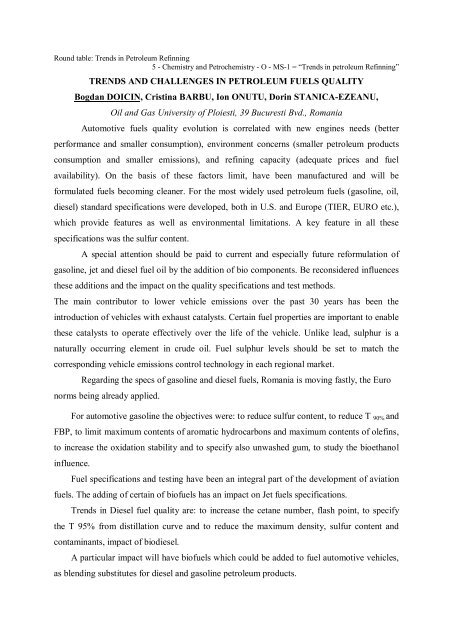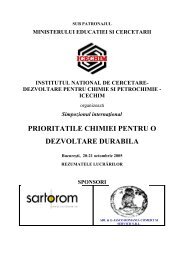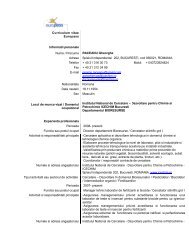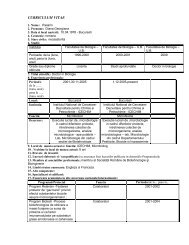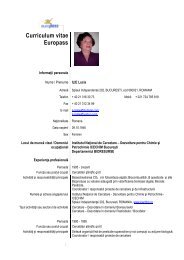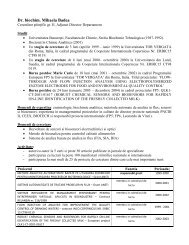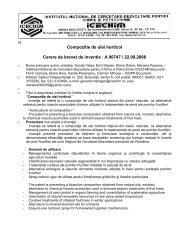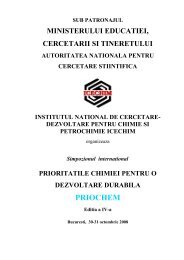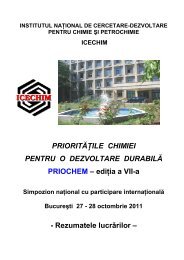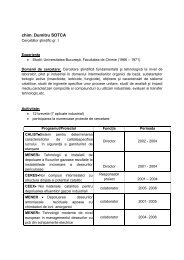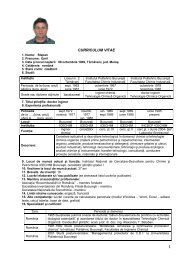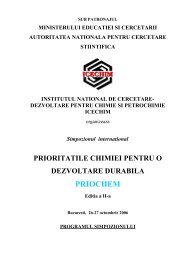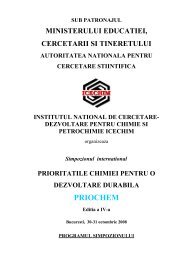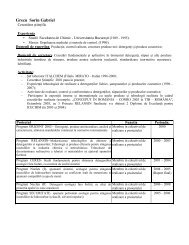INSTITUTUL NAÅ¢IONAL DE CERCETARE-DEZVOLTARE - ICECHIM
INSTITUTUL NAÅ¢IONAL DE CERCETARE-DEZVOLTARE - ICECHIM
INSTITUTUL NAÅ¢IONAL DE CERCETARE-DEZVOLTARE - ICECHIM
- No tags were found...
Create successful ePaper yourself
Turn your PDF publications into a flip-book with our unique Google optimized e-Paper software.
Round table: Trends in Petroleum Refinning5 - Chemistry and Petrochemistry - O - MS-1 = “Trends in petroleum Refinning”TRENDS AND CHALLENGES IN PETROLEUM FUELS QUALITYBogdan DOICIN, Cristina BARBU, Ion ONUTU, Dorin STANICA-EZEANU,Oil and Gas University of Ploiesti, 39 Bucuresti Bvd., RomaniaAutomotive fuels quality evolution is correlated with new engines needs (betterperformance and smaller consumption), environment concerns (smaller petroleum productsconsumption and smaller emissions), and refining capacity (adequate prices and fuelavailability). On the basis of these factors limit, have been manufactured and will beformulated fuels becoming cleaner. For the most widely used petroleum fuels (gasoline, oil,diesel) standard specifications were developed, both in U.S. and Europe (TIER, EURO etc.),which provide features as well as environmental limitations. A key feature in all thesespecifications was the sulfur content.A special attention should be paid to current and especially future reformulation ofgasoline, jet and diesel fuel oil by the addition of bio components. Be reconsidered influencesthese additions and the impact on the quality specifications and test methods.The main contributor to lower vehicle emissions over the past 30 years has been theintroduction of vehicles with exhaust catalysts. Certain fuel properties are important to enablethese catalysts to operate effectively over the life of the vehicle. Unlike lead, sulphur is anaturally occurring element in crude oil. Fuel sulphur levels should be set to match thecorresponding vehicle emissions control technology in each regional market.Regarding the specs of gasoline and diesel fuels, Romania is moving fastly, the Euronorms being already applied.For automotive gasoline the objectives were: to reduce sulfur content, to reduce T 90% andFBP, to limit maximum contents of aromatic hydrocarbons and maximum contents of olefins,to increase the oxidation stability and to specify also unwashed gum, to study the bioethanolinfluence.Fuel specifications and testing have been an integral part of the development of aviationfuels. The adding of certain of biofuels has an impact on Jet fuels specifications.Trends in Diesel fuel quality are: to increase the cetane number, flash point, to specifythe T 95% from distillation curve and to reduce the maximum density, sulfur content andcontaminants, impact of biodiesel.A particular impact will have biofuels which could be added to fuel automotive vehicles,as blending substitutes for diesel and gasoline petroleum products.


